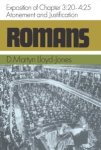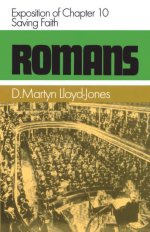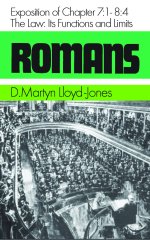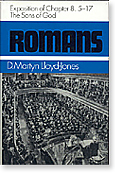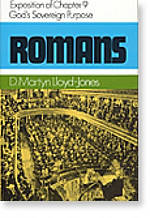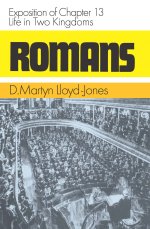1. One 1
Connection with chapter one – the man being addressed – the Jew, the law and circumcision – the subtlety of sin in denying justification by faith – separation of doctrine and life.
- Two 16
Proof that the Jews, too, are without excuse – the essence and attitude of sin – denouncing others, condemning ourselves – judgment according to truth – penetrating and impartial judgment.
- Three 30
Judgment and the nature of the atonement – no escaping the judgment of God – misuse of God’s goodness to deny judgment – a low estimate of the riches of God’s goodness – forbearance and longsuffering.
- Four 46
Longsuffering considered as a licence to sin – insulting God – God’s design in repentance – constraining grace not irresistible – the priority and necessity of repentance.
- Five 59
The meaning of repentance – changing our mind and our course of action – our attitude to God, ourselves, life and death – a hard and impenitent heart in control – the treasury of wrath.
- Six 74
Universal, but individual, judgment – no privileged positions – judgment according to works – the tests of the righteous and unrighteous – their attitude, general tenor of life, and practice – the two destinies.
- Seven 90
Justification by works and the context – the grounds of condemnation and the evidence of faith – the dangers of Sandemanianism, antinomianism and believism.
- Eight 101
God is unbiased – Jews, Gentiles and the law – judgment according to our situation – the Jews’ greater opportunity – Christ, the Judge who knows our secrets – Paul’s gospel.
- Nine 115
The parenthesis – doing the law, not hearing it, is what counts – the Gentiles’ moral consciousness proved – three false deductions about their condition – the impossibility of ‘living up to our light’.
- Ten 128
God’s standards – both Jews and Gentiles condemned – objections about ‘righteous’ people, ‘noble’ philosophers and ‘good’ pagans – application to the Jews in terms of their failure to act according to their knowledge.
- Eleven 142
Jewish hypocrisy exposed – intellectualism, complacency and lack of self-examination – failure to practise what they preach – effect on the Gentiles’ opinion of God and the gospel – external and inward circumcision – let every man examine himself.
- Twelve 160
Analysis of chapter three – the Jews’ privilege of having the oracles of God – our duty to defend the Scriptures entrusted to us and to pass them on – Christian parents and their children.
- Thirteen 174
What about Jewish unbelief! – God’s faithfulness, truth and justice are not to be questioned – false logic of another objection condemned – how to deal with difficulties – inevitable exposure to the charge of antinomianism.
- Fourteen 188
Only two categories of men – all are under sin since the Fall – Paul’s chain of evidence – the primacy of conviction of sin – the blackness of sin and the glory of grace – the plan of the quotations – no one is truly righteous.
- Fifteen 201
Man’s condition as a result of sin – lack of spiritual understanding – the meaning of seeking God – the general effects of sin on our conduct – a terrifying mirror: the particular manifestations of sin in word and deed.
- Sixteen 215
The fear of God: reverence, worship and an awareness of God the Judge – the argument summarized – examples of the whole world speechless before God – universal liability to God’s wrath – thanksgiving and praise for the blood of Christ.
1. One 1
Connection with chapter one – the man being addressed – the Jew, the law and circumcision – the subtlety of sin in denying justification by faith – separation of doctrine and life.
- Two 16
Proof that the Jews, too, are without excuse – the essence and attitude of sin – denouncing others, condemning ourselves – judgment according to truth – penetrating and impartial judgment.
- Three 30
Judgment and the nature of the atonement – no escaping the judgment of God – misuse of God’s goodness to deny judgment – a low estimate of the riches of God’s goodness – forbearance and longsuffering.
- Four 46
Longsuffering considered as a licence to sin – insulting God – God’s design in repentance – constraining grace not irresistible – the priority and necessity of repentance.
- Five 59
The meaning of repentance – changing our mind and our course of action – our attitude to God, ourselves, life and death – a hard and impenitent heart in control – the treasury of wrath.
- Six 74
Universal, but individual, judgment – no privileged positions – judgment according to works – the tests of the righteous and unrighteous – their attitude, general tenor of life, and practice – the two destinies.
- Seven 90
Justification by works and the context – the grounds of condemnation and the evidence of faith – the dangers of Sandemanianism, antinomianism and believism.
- Eight 101
God is unbiased – Jews, Gentiles and the law – judgment according to our situation – the Jews’ greater opportunity – Christ, the Judge who knows our secrets – Paul’s gospel.
- Nine 115
The parenthesis – doing the law, not hearing it, is what counts – the Gentiles’ moral consciousness proved – three false deductions about their condition – the impossibility of ‘living up to our light’.
- Ten 128
God’s standards – both Jews and Gentiles condemned – objections about ‘righteous’ people, ‘noble’ philosophers and ‘good’ pagans – application to the Jews in terms of their failure to act according to their knowledge.
- Eleven 142
Jewish hypocrisy exposed – intellectualism, complacency and lack of self-examination – failure to practise what they preach – effect on the Gentiles’ opinion of God and the gospel – external and inward circumcision – let every man examine himself.
- Twelve 160
Analysis of chapter three – the Jews’ privilege of having the oracles of God – our duty to defend the Scriptures entrusted to us and to pass them on – Christian parents and their children.
- Thirteen 174
What about Jewish unbelief! – God’s faithfulness, truth and justice are not to be questioned – false logic of another objection condemned – how to deal with difficulties – inevitable exposure to the charge of antinomianism.
- Fourteen 188
Only two categories of men – all are under sin since the Fall – Paul’s chain of evidence – the primacy of conviction of sin – the blackness of sin and the glory of grace – the plan of the quotations – no one is truly righteous.
- Fifteen 201
Man’s condition as a result of sin – lack of spiritual understanding – the meaning of seeking God – the general effects of sin on our conduct – a terrifying mirror: the particular manifestations of sin in word and deed.
- Sixteen 215
The fear of God: reverence, worship and an awareness of God the Judge – the argument summarized – examples of the whole world speechless before God – universal liability to God’s wrath – thanksgiving and praise for the blood of Christ.
Trustpilot


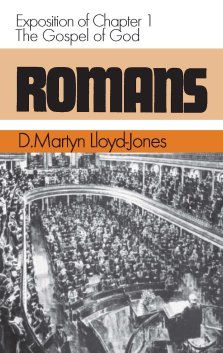
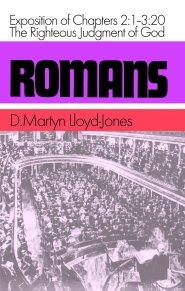

![The Untold Story of the New Testament Church [Revised and Expanded]](https://www.eden.co.uk/images/150/ef6e5dac9021-9780768461626.jpg)

